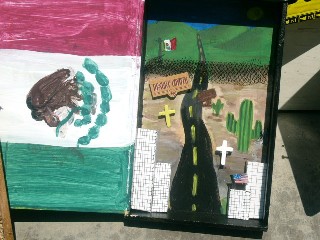|
Border Justice |
|
| Return to Natalie's Home Page |
Observing the Campus Forum on “Migrants, Justice and the Border" “Migrants, Justice and the Border” was the theme of the three day event on the ASU West Campus spreading across the walls all the way on to the grassy, populated center of the campus for all passing students to see. Whether or not they were attending the forum, everyone walking through seemed to be somewhat affected by the art that was displayed outside. Interest levels varied from simple curiosity to actually finding out what was going on, or even attending some of the events. The students did not seem to be interested in getting more educated in the issues, even though the art displays caught their eyes. The people most interested in being educated were the people that were already involved in the forum along with other groups of similar interests.
One of the many Cajitas (memorials for victims who died trying to cross the border) at ASU West during the event The overarching theme of the forum was to educate people in Arizona about our migrant issues. There are many different aspects to the migrant population including the anti-migration acts such as Protect Arizona Now, and questionable actions being taken by our Border Patrol. There are over 200 people dying in the desert trying to cross the border every year, and this doesn’t seem to concern enough people to take any action. The BorderLinks network tries to educate people on just what it takes to get through the border, including up to 20 years waiting for a green card or visa. The Border Patrol has representatives with pre-planned speeches on how they are doing the best they can, and doing it in a humane way. They assure us there is no unnecessary hostility, yet programs like BorderLinks report many cases of just that. In another area of concern, there are many women being abducted and killed just over the border in Juarez. This topic is very disturbing since the women are mostly working in American factories that are set up in Juarez for cheap labor; these women are leaving work in the dark and being abducted on their way home. The groups are asking for lights, more police, more investigation, and support in keeping their women safe and alive. This fits into the theme of the forum because it is concerned about the welfare of people, and the consequences of American business using migrants, and cheap labor in other countries without caring what happens to the overall economy of the country or the people, but it also does not fit into the forum simply because they are not talking about migrants. I didn’t understand what we are supposed to do about a legal and criminal problem that is happening across the border, we simply don’t have the jurisdiction to take care of what their police should be, not that our country doesn’t get involved regardless, but I don’t know who they want us to send over there and why their police would cooperate. I was extremely disappointed in the panel discussion on “Metropolitan Borderlands: Migrant Justice in Phoenix”. This panel consisted of about 5 speakers whom all had different issues but no suggestions on how to fix these problems. The only hopeful in the group was Jose Cortez and his NGO, Chicanos por la Causa. This organization actually helps migrants, legal status or not, with health care, educational support, and even nutritional support. Like the NGO in the film we saw during class, it takes a lot of volunteers, time and money that isn’t always readily available. It would have seemed like a good idea for him to use some of his time trying to recruit more volunteers, or at least have information available for people who may have been interested in what they could to be a part of the organization. This applies to all of the speakers but one, who actually did offer papers outside the door for us to contact legislation. This movement needs to gather more public support with contacting local government and legislation. More focus on influencing these people could get the ball rolling in the right direction and maybe the local government could start making changes and influencing higher powers. Similar to the collective action frame of the anti-globalization movement that I attended on the Tempe campus in February, the people involved are mostly students with a small part being people who have been involved for many years, and people who have had personal confrontations with the migration issue in their own lives. This adds up to many different complaints all under the title of “Migrants, justice, and the Border” which can also be confusing to the average person. This forum also seems to run into the problem of summing up grievances into an easily understood statement that is going to explain itself to the average person uneducated in migration issues. To contact BorderLinks: www.borderlinks.org/To contact Chicanos por la causa:
|
| Return to Migration and Culture Home Page | |


